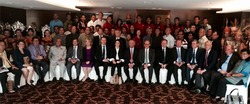PANAP| 2 December 2014
Press Release
PANAP, Sarawak IP group hold forum on IP rights with EU Delegation to Malaysia
Press Release
PANAP, Sarawak IP group hold forum on IP rights with EU Delegation to Malaysia
KUCHING, Sarawak, Malaysia – Regional advocacy group PAN Asia Pacific (PANAP) held a forum on the state of indigenous people’s rights with the European Union (EU) Delegation to Malaysia at the Hilton hotel in Kuching, State of Sarawak last 26 November. The forum was also co-organized by PANAP partner Sarawak Dayak Iban Association (SADIA).
Fifteen diplomatic leaders including ambassadors from the EU led by His Excellency Luc Vandebon, Head of the EU Delegation, attended the forum, which highlighted pressing issues affecting indigenous communities in Sarawak including education and employment, forestry development projects and issues on native customary land. Some 120 participants, mostly leaders and members of indigenous communities from SADIA’s network across Sarawak also attended the event.
Aside from Ambassador Vandebon, also present at the forum were the ambassadors of Austria, Belgium, Czech Republic, Denmark, Germany, Spain, Sweden, and the Netherlands as well as the charge de affaires of Croatia and deputy heads of mission of Finland and France. Joining them were the Head of Trade of the EU Delegation and officers from their political affairs and press and information.
Reference: Ms. Sarojeni Rengam, PANAP Executive Director, [email protected]
“We welcome this opportunity to have a lively exchange of views and to create a better understanding of the struggles of indigenous communities in Sarawak,” PANAP executive director Sarojeni Rengam said in her speech to open the forum.
Ranking officials from the State Government of Sarawak also attended the forum including the Forestry Director, Secretary General for the Ministry, State Attorney General, and the Deputy Secretary of the Tourism Ministry, among others.
Addressing the EU ambassadors, leaders of indigenous communities, state officials and representatives of civil society groups, Rengam expressed hope that the different stakeholders can “work together to uphold the rights of indigenous peoples” even as she emphasized the leading role that the indigenous communities must play.
“As direct stakeholders, they (indigenous peoples) must take the lead in the campaign to oppose the corporate takeover of their land and resources and in promoting their native customary rights, and civil and political rights,” said Rengam.
Ambassador Vandebon, meanwhile, reiterated the importance that the EU places on indigenous peoples and human rights. “Indigenous peoples contribute extensively to humanity. Their contributions to the world heritage are invaluable, many of the areas they inhabit are considered crucial for the conservation of biodiversity,” said Vandebon.
Unfortunately, these communities are facing serious problems, according to the EU official. “Issues of violence and brutality, continuing assimilation policies, dispossession of land, marginalization, forced removal or relocation, denial of land rights, impacts of large-scale development, abuses by military forces and a host of other abuses are reported. The European Union considers that discrimination on grounds such as racial and ethnic origin is incompatible with the basic principles on which the European Union is founded,” Vandebon added.
Vandebon also recalled the EU Delegation’s project with PANAP and SADIA aiming to protect the human rights to land and food of indigenous communities in Sarawak, which was completed in November 2013. “We are very happy to have been able to support this excellent project,” said Vandebon.
For his part, Mr. Sidi Munan, president of SADIA, underscored the need for the Malaysian government to legislate a law that will implement articles 25 and 26 of the United Nations Declaration on the Rights of Indigenous Peoples (UNDRIP).
Article 25 pertains to the right of indigenous peoples to “take the lead in the campaign to oppose the corporate takeover of their land and resources and in promoting their native customary rights (NCR) and civil and political rights”. Meanwhile, Article 26 states, “(1) Indigenous peoples have the right to the lands, territories and resources which they have traditionally owned, occupied or otherwise used or acquired; (2) Indigenous peoples have the right to own, use, develop and control the lands, territories and resources that they possess by reason of traditional ownership or other traditional occupation or use, as well as those which they have otherwise acquired; and (3) States shall give legal recognition and protection to these lands, territories and resources. Such recognition shall be conducted with due respect to the customs, traditions and land tenure systems of the indigenous peoples concerned.”
Reference: Ms. Sarojeni Rengam, PANAP Executive Director, [email protected]













